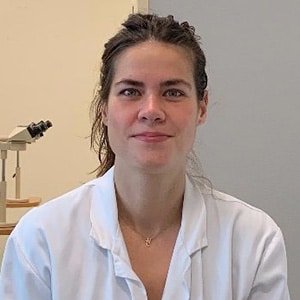New research suggests that modifying a patient’s gut microbiome may make their cancer more likely to respond to immunotherapy, providing an innovative strategy that builds upon years of research linking the microbiome to the immune system.
The study, published in the American Association for Cancer Research (AACR) journal Cancer Discovery, was led by Camille Bigenwald, MD, PhD, and Laurence Zitvogel, MD, PhD, both of Gustave Roussy Cancer Centre in France, and addresses one of the major problems facing a form of immunotherapy known as chimeric antigen receptor (CAR) T-cell therapy.
CAR T-cell therapy has in recent years revolutionized the treatment of hematological malignancies. By engineering a patient’s own immune cells to recognize and attack their cancer, this therapy offers a powerful way to exploit and enhance the immune system’s natural ability to fight cancer. A variety of challenges, however, limit its effectiveness in many patients, including the long manufacturing time, the risk of some potentially life-threatening toxicities, and the low response rates.
“Patients undergoing CAR T-cell therapy have approximately a 50% chance of achieving remission, which means 50% of patients do not respond adequately to treatment,” said Bigenwald.
Many factors influence how well a patient’s cancer responds to immunotherapies like CAR T-cell therapy. Prior studies have illustrated the impact of the gut microbiome, uncovering how changes to its composition can reduce the efficacy of immunotherapy due to the depletion of nutrients required for proper immune function, the reduction of immune-activating microbial patterns, and the loss of bacteria that can infect cancer cells and trigger an immune response within the tumor.
Last year, Zitvogel and colleagues reported that the presence of certain bacterial communities within a patient’s gut microbiome was associated with responses to immune checkpoint inhibition, another type of immunotherapy. They then used this information to develop a response prediction model called TOPOSCORE. (Read our earlier blog post to learn more about this study.)
The latest study expands the relevance of TOPOSCORE by demonstrating that the same model can also predict responses to CAR T-cell therapy. The study then takes it a step further—not only identifying patients who are less likely to experience a response to CAR T-cell therapy, but also finding a way to increase their chances of a tumor response.
“Importantly, we demonstrated that modulating host parameters such as the microbiota can enhance tumor control by CAR T cells,” said Bigenwald. “These findings represent a crucial first step toward developing microbiota-targeted interventions … to improve patient outcomes before initiating CAR T-cell infusions.”
How Does CAR T-cell Therapy Impact the Gut Microbiome?
The researchers began their study by analyzing changes to the gut microbiome over the course of treatment in a prospective cohort of 58 patients with B-cell malignancies. Eighty-four percent of patients received an antibiotic prior to receiving CAR T-cell therapy, and nearly all patients received broad-spectrum antibiotics within a month after CAR T-cell infusion. Prophylactic antibiotic use is common among patients receiving CAR T-cell therapy since the lymphodepleting chemotherapy that precedes CAR T-cell infusion puts patients at risk of infections.
Consistent with prior reports, the analysis showed that antibiotic use and lymphodepleting chemotherapy each affected the composition of the gut microbiome (a change known as dysbiosis). Of note, dysbiosis was dramatically exacerbated after CAR T-cell infusion, suggesting that CAR T-cell therapy itself was disrupting the gut microbiome. This led the researchers to ask whether the treatment-related changes were influencing how the patients’ cancers responded to CAR T-cell therapy.
Does the Gut Microbiome Affect Responses to CAR T-cell Therapy?
In prior studies, researchers used the TOPOSCORE prediction model to stratify patients into one of two species-interacting groups (SIGs) based on the pretreatment composition of their gut microbiome, with patients in the SIG1 group less likely to experience a response to immune checkpoint inhibition than those in the SIG2 group.
In the new study, the researchers applied TOPOSCORE to patient stool samples collected at baseline (prior to lymphodepleting chemotherapy) and determined that the SIG2 bacterial communities were also associated with response to CAR T-cell therapy and longer progression-free survival.
“This suggests that the SIG2 signature could serve as a valuable biomarker for patient stratification across multiple immunotherapy platforms,” Bigenwald noted.

Digging deeper into the specific bacterial species associated with treatment response, the researchers identified the presence of Akkermansia muciniphila at baseline as the strongest predictor of response to CAR T-cell therapy. All patients whose baseline gut microbiomes included Akkermansia experienced treatment responses within the first six months, compared with 42% of patients whose microbiomes did not contain this bacterium.
Moreover, the microbiomes containing Akkermansia did not undergo the composition changes the researchers had observed after CAR T-cell infusion, suggesting that the presence of these bacteria might promote treatment responses by preventing treatment-related gut dysbiosis.
Unfortunately, only 20% of patients in the study presented with Akkermansia at baseline, which means that the majority of patients may have B-cell malignancies that are unlikely to respond to CAR T-cell therapy.
Does Therapeutically Modifying the Gut Microbiome Improve Responses?
Given the strong association of Akkermansia with treatment response, Bigenwald, Zitvogel, and colleagues hypothesized that supplementing patients’ microbiomes with this bacterium may increase their chances of having a response to CAR T-cell therapy.
To test this approach, they turned to immunocompetent mouse models of B-cell lymphoma and found that mice who received orally delivered Akkermansia alongside CAR T-cell therapy had significantly greater tumor shrinkage and longer survival than mice who received CAR T-cell therapy without the Akkermansia supplementation. Importantly, these improvements were not seen in mice supplemented with other bacterial species, underscoring the role of Akkermansia.
How Does Akkermansia Supplementation Improve CAR T-cell Efficacy?
So, what exactly is Akkermansia doing to exert such a profound effect? Its presence doesn’t impact the number of circulating CAR T cells, their infiltration into tumors, nor the tumor microenvironment, the researchers found.
The presence of Akkermansia in the gut does, however, significantly enhance the number of CAR T cells infiltrating the bone marrow, as well as increase the levels of immune-activating cytokines within the bone marrow.
And it does so through Akkermansia’s metabolic processes that promote the production of metabolites called indoles, which travel from the gut to bone marrow. In the bone marrow, they impact CAR T-cell activity through engagement of the aryl hydrocarbon receptor on CAR T cells.

Together, the results suggest that the low response rates to CAR T-cell therapy may be due to therapy-related changes to the gut microbiome, and that these changes can be prevented by gut Akkermansia. But since most patients’ gut microbiomes do not contain Akkermansia at baseline, the researchers propose supplementation as a way to improve responses to CAR T-cell therapy.
Bigenwald suggested that patients’ gut microbiomes could be supplemented with Akkermansia harvested from healthy volunteers or with live bacterial products that promote Akkermansia colonization.
Is This Intervention Clinically Available?
Not yet. While it’s a promising new strategy to enhance CAR T-cell therapy, Bigenwald cautioned that further research is needed before Akkermansia supplementation could be widely used in the clinic.
In the short term, Bigenwald, Zitvogel, and colleagues plan to examine whether supplementing with a mixture of metabolites would be an effective alternative to Akkermansia supplementation.
In the long term, the researchers plan to launch clinical trials to evaluate the impact of personalized, biomarker-driven and microbiome-centered interventions, such as fecal microbiota transplants, live biotherapeutics, or prebiotics—strategies that, according to Bigenwald, have the potential to “transform the standard of care for patients with hematological malignancies.”


